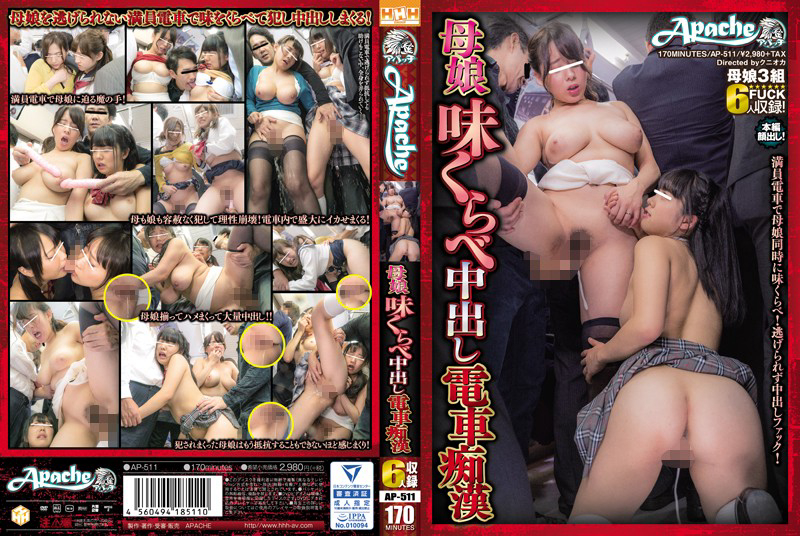JAV AP-511: Mother-Daughter Yuri Companion and Controversies
The AP-511 Mother Daughter Yuri Companion series is a notable entry within the niche of Japanese adult animation and manga, known for its exploration of complex relationships and provocative themes. Among its various episodes, the "Crazy Train Molest" installment has garnered attention for its controversial content and distinctive storytelling approach. This article provides an in-depth examination of the series, focusing on its themes, character dynamics, artistic style, audience reception, and ethical considerations. By analyzing these aspects, we aim to offer a comprehensive understanding of this provocative work within its genre and cultural context.
Overview of the AP-511 Mother Daughter Yuri Companion Series
The AP-511 Mother Daughter Yuri Companion series is a collection of adult-oriented media that centers around romantic and erotic relationships between mothers and daughters, often within a yuri (female-female) framework. The series is known for blending explicit content with narrative elements that delve into emotional and psychological themes, making it stand out in its genre. Each installment typically features a standalone story, with "Crazy Train Molest" being one of its more notorious entries. The series aims to explore taboo topics through stylized storytelling, often pushing boundaries to evoke strong reactions from viewers.
The series is characterized by its focus on intimacy, power dynamics, and complex emotional states. It balances explicit scenes with character development, attempting to create scenarios that are both titillating and psychologically engaging. The "Mother Daughter" theme is central, often exploring the tension and forbidden allure of such relationships. The "Yuri Companion" aspect emphasizes female-female romantic interactions, which are portrayed with a focus on emotional depth and sensuality. The series caters to a specific audience interested in exploring unconventional relationship narratives within adult media.
Produced by a niche studio specializing in adult anime and manga, the AP-511 series has gained a cult following due to its bold content and distinctive style. It is typically distributed through specialized outlets, emphasizing its target demographic. Despite its controversial nature, the series maintains a certain level of artistic ambition, often employing stylized animation and storytelling techniques to enhance its themes. The "Crazy Train Molest" episode is particularly remembered for its intense and provocative depiction of its subject matter, sparking discussions among fans and critics alike.
Throughout its run, the series has faced criticism and censorship due to its explicit and taboo content. However, it also has defenders who argue that it pushes creative boundaries and explores complex human emotions and desires. The series remains a polarizing work within adult anime and manga circles, reflecting broader debates about freedom of expression, ethical boundaries, and the portrayal of sensitive topics in media. Its place within the genre is marked by its willingness to confront difficult themes head-on, making it a significant, if controversial, cultural artifact.
Overall, the AP-511 Mother Daughter Yuri Companion series exemplifies a niche but influential segment of adult entertainment that seeks to combine eroticism with narrative depth. Its episodes, including "Crazy Train Molest," serve as case studies for examining how taboo themes are handled in visual storytelling. Despite its provocative content, the series contributes to ongoing conversations about sexuality, morality, and artistic expression within adult media.
Exploring the Themes and Narrative of the Crazy Train Molest Episode
The "Crazy Train Molest" episode is one of the most controversial entries in the AP-511 series, primarily due to its intense exploration of taboo themes. The narrative centers around a train journey where the protagonist, a mother, and her daughter find themselves in increasingly provocative and morally ambiguous situations. The story employs a surreal, almost disorienting tone, emphasizing the chaos and emotional turmoil experienced by the characters. Its title alludes to a metaphorical "train" representing a descent into obsession, madness, or uncontrollable desire.
Themes of power, control, and forbidden love are prevalent throughout the episode. It delves into the psychological states of the characters, portraying their internal conflicts and suppressed urges. The episode explores how societal taboos and personal boundaries are challenged in extreme circumstances, often blurring the lines between consent and coercion. The narrative employs a combination of provocative scenes and introspective moments to evoke a sense of psychological unease, aiming to provoke thought about the nature of desire and morality.
The storyline is characterized by its nonlinear and psychological approach, often using vivid imagery and symbolism to communicate deeper meanings. The "Crazy Train" motif symbolizes a loss of control, chaos, and the descent into darker aspects of human psychology. The episode does not shy away from depicting intense and explicit scenes, which serve to underscore the emotional and physical tumult experienced by the characters. Its narrative structure is designed to evoke discomfort and challenge viewers’ perceptions of ethical boundaries.
Critics have noted that "Crazy Train Molest" pushes the limits of conventional storytelling in adult media, employing a mix of surrealism and psychological horror elements. The episode aims to explore the darker sides of human nature, including obsession, madness, and the corrupting influence of forbidden desires. While some interpret it as a critique of societal repression, others see it as an exploitation of taboo themes. The episode’s provocative nature has sparked debate about the line between artistic expression and ethical responsibility in adult entertainment.
Overall, the episode’s narrative is a complex tapestry of psychological horror, eroticism, and social commentary. Its themes are intentionally provocative, encouraging viewers to confront uncomfortable truths about desire and morality. The storytelling approach emphasizes emotional intensity and symbolic imagery to create a visceral experience that remains impactful long after viewing. As such, it exemplifies the series’ willingness to address controversial topics head-on, often leaving audiences with more questions than answers.
Character Dynamics and Relationships in the AP-511 Series
The character dynamics within the AP-511 Mother Daughter Yuri Companion series are central to its storytelling and thematic exploration. The relationship between mother and daughter is portrayed with a focus on complex emotional layers, often blending tenderness with taboo elements. In "Crazy Train Molest," these dynamics are heightened by the episode’s intense and provocative scenes, emphasizing themes of forbidden attraction, psychological conflict, and power imbalance. The characters’ interactions are crafted to evoke both empathy and discomfort, prompting viewers to reflect on the underlying emotional currents.
The mother character is typically depicted as a figure of authority and nurturing, yet her interactions in this episode reveal darker, more conflicted aspects of her personality. The daughter, meanwhile, navigates her feelings of confusion, desire, and guilt. Their relationship is portrayed as a tangled web of emotional dependency, repression, and rebellion against societal norms. The series often explores how these complex dynamics can lead to destructive behavior, highlighting the psychological toll of forbidden relationships.
In addition to the central mother-daughter pair, supporting characters and external influences play a role in shaping the narrative. These elements serve to deepen the psychological landscape, illustrating how external pressures and internal desires intersect. The characters’ dialogues and interactions are often laden with symbolism, reflecting their internal struggles and the broader themes of the story. The episode’s character development aims to evoke empathy, discomfort, or fascination, depending on the viewer’s perspective.
The series also emphasizes the power dynamics inherent in such relationships, exploring themes of control, coercion, and consent. In "Crazy Train Molest," these themes are intensified by the chaotic and surreal narrative, challenging viewers to consider the morality of the characters’ actions. The characters’ psychological states are depicted with nuance, illustrating how repressed desires can lead to destructive outcomes. Overall, the character relationships serve as a mirror for exploring wider societal taboos and psychological phenomena.
Despite the controversial nature of these relationships, the series attempts to portray them with a degree of complexity and depth. It avoids simplistic moral judgments, instead presenting characters as multifaceted individuals driven by a mixture of vulnerability, desire, and conflict. This nuanced portrayal invites viewers to consider the underlying human emotions at play, even within highly taboo contexts. The character dynamics are thus a key element in understanding the series’ provocative but thought-provoking approach.
Visual Style and Artistic Elements in the Mother Daughter Yuri Content
The visual style of the AP-511 series, including "Crazy Train Molest," is marked by its distinctive animation techniques and artistic choices. The series employs stylized character designs, often featuring exaggerated expressions and fluid movements that heighten emotional intensity. The color palette tends to be bold and contrasting, emphasizing mood shifts and symbolic imagery. The animation quality varies, but in episodes like "Crazy Train Molest," there is a focus on creating visceral, impactful scenes that evoke strong reactions.
Artistic elements such as framing, lighting, and symbolism play a crucial role in conveying the series’ themes. Scenes are often composed with dramatic angles and close-ups that accentuate emotional and physical details. Lighting effects are used to create mood—ranging from warm, intimate tones to stark, unsettling contrasts that mirror the psychological states of the characters. Symbolic imagery, including train motifs and surreal backgrounds, enhances the narrative’s psychological and thematic depth.
The series also employs visual metaphors and abstract sequences to evoke subconscious themes and emotional undercurrents. In "Crazy Train Molest," these artistic choices serve to disorient viewers and emphasize the chaos and psychological turmoil depicted in the story. The use of surreal visuals and symbolic colors aims to immerse the audience in the characters’ disturbed mental landscapes, blurring the lines between reality and hallucination.
Sound design and music complement the visual elements, often utilizing discordant or haunting scores to heighten tension and unease. The combination of visual artistry and auditory cues creates an immersive experience that amplifies the episode’s provocative themes. Despite its explicit content, the series demonstrates a commitment to artistic expression, using visual storytelling techniques that elevate it beyond mere exploitation.
Overall, the artistic approach in the AP-511 series reflects an intent to evoke emotional and psychological responses through stylized visuals. The careful use of symbolism, composition, and color contributes to a distinctive aesthetic that supports the series’ controversial themes. These artistic elements serve to deepen viewers’ engagement, encouraging them to interpret the story’s underlying messages and emotional nuances.
Audience Reception and Critical Responses to the Series
The AP-511 Mother Daughter Yuri Companion series has elicited a wide range of reactions from audiences and critics alike. Its provocative content, especially episodes like "Crazy



